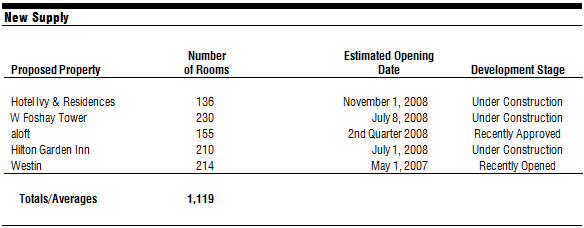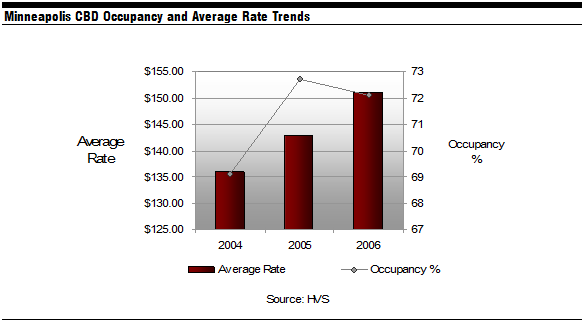Minneapolis, consistently ranked among the nation’s top cities to live and work, owes much of its reputation to its diversity. Even the name itself, formed from the Dakota mni (water) and Greek polis (city), betokens diversity, and the city’s highly educated workforce hails from a wide variety of national and international origins. Minneapolis trails only New York City in number of theater seats per capita, and no home within its limits lies more than one-half mile from a city park,[1] evidence of the city’s investment in both nature and culture.
An efficient transportation infrastructure makes the city’s hotels, banks, restaurants, and retailers easily accessible both within the immediate locality and to the greater region. The downtown area features one of the most masterfully integrated skywalk systems in the world, connecting virtually every major building in an eight-block radius via a second-story interior corridor system. The Hiawatha rail line links downtown with the Minneapolis-St. Paul International Airport, the Hubert H. Humphrey Metrodome, and the mammoth Mall of America in Bloomington. A plan for an eleven-mile rail line expansion project includes 16 new stations serviced by 31 light rail vehicles, which would run every 7.5 minutes during peak travel periods.[2] The expansion is scheduled for completion in 2014, and will link the current Hiawatha line to downtown St. Paul.
The Minneapolis-St. Paul Metropolitan Airport Commission is working to facilitate more national and international travel as well. A $3.1-billion expansion effort, with projects scheduled through 2010, will improve virtually every aspect of the Minneapolis-St. Paul International Airport. Many improvements are already complete, including the new Humphrey Terminal, two new Lindbergh Terminal concourses, a new runway, an additional 11,000 parking spaces, new cargo facilities, and numerous airfield projects. Infrastructural improvements of such massive scale will support the further growth and development of this world-class city.
The Minneapolis-St. Paul area boasts one of the healthiest economies in the United States. Home to such corporate giants as the Target Corporation and Best Buy Co., Inc., as well as The Federal Reserve Bank of Minneapolis, the greater Twin Cities region acts as the primary commercial and financial hub between Chicago and Seattle. Considerable retail and commercial growth within the last decade has increased business activity in downtown Minneapolis and prompted the construction and redevelopment of several buildings. Redevelopment projects threaded throughout surrounding residential loft/condo projects, entertainment and theater venues, as well as retail and restaurant establishments, are expected to weave more pedestrian and leisure activity into the downtown area. The repercussions of this development have sounded throughout the lodging market, and most of downtown’s larger and more dated hotels have undergone or are in the midst of major renovations in an effort to compete with an incoming wave of new supply. The following table lists some recently opened and proposed hotel projects slated for the downtown area:

Consistent demand, sourced by local employers, weekend events, citywide conventions, and commercially based meetings, has kept lodging trends in this area relatively stable. Established companies such as Target, Wells Fargo, TCF Bank, and American Express continue to drive the local economy and contribute heavily to the city’s lodging demand.
Occupancy rates within Minneapolis’ Central Business District (CBD) have seen modest increases since the nationwide recession in 2002. Prior to this time, the city had surpassed national occupancy rates year-over-year and was somewhat sheltered from the national economic struggles earlier this decade. Heavy visitation spurred by national sporting events and citywide conventions buffered the city’s lodging market against the brunt of difficult times, while the national average suffered more extensively. More recently, national trends indicate a declining cycle for lodging demand, and growth rates in Minneapolis show evidence of stabilization as new supply enters the CBD market.
While relatively strong occupancy rates were the yield, lower average daily rates were the concession as the downtown area’s hotels offered significant discounts to ensure a stable inflow of clientele. Put in perspective, however, the situation hardly looked bleak, as average daily rates within the Minneapolis CBD continued to be significantly higher than the national average. These trends are attributed primarily to the diversified economic base within the greater Twin Cities area. Major corporations are generally less inclined to bargain for the lowest rate, and the Twin Cities happen to have 26 Fortune 500 companies driving demand toward area hotels—which thereby command higher rates. Since 2004, average daily rates have shown positive growth, and this trend is expected to continue into the near term.

Overall, the outlook for the downtown Minneapolis lodging market is positive. Although occupancy rates may waver with the ripples of new supply, average rate trends should take hold and realize sizable increases into the near term. Minneapolis’ citywide redevelopment, infrastructure, and leisure improvement projects should add to the city’s distinction as one of the nation’s best places to live, work, and visit, thus bringing continued good consequence to hoteliers.